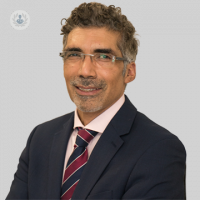Advice on calcium – how much is needed for healthy bones?
Written by:Just how much calcium should I be getting? Dr Taher Mahmud of the London Osteoporosis Clinic discusses nutrition, and how calcium intake can help build healthy bones, especially while we are young.
Calcium is an essential nutrient. In fact, it is the most abundant mineral in the human body, and plays an important role in its functions. 99% of the calcium in our bodies is found in the teeth and bones, forming an integral part of their structure. In a healthy structure, the body removes small quantities of calcium from the bones and replaces it with new calcium. If the bones receive less calcium than they have taken away, this leads to a deficit and causes bones to become weak, making them more prone to fractures and breaks.
If our diet is calcium-rich, it allows the body to deposit the calcium it gets from food and drink into our bones, meaning our bones stay strong and healthy. When you are younger, building healthy bones is essential, and children and young adults who eat calcium-rich diets can build up stores in their bones, ensuring they have the best start in life.
We can often think of calcium deposits and our bones like a bank – build up a healthy saving in order to be well-off, and have less risk, later in life. It is also important to note that calcium is just one part in the process of building bones. We can put money into the bank, but we also need something to help facilitate that. In the case of the bones, this means other nutrients, like vitamin D, vitamin K, and magnesium.
How much calcium do I need?
The UK government have set recommendations on the level of calcium we should be consuming, which is as follows:
|
Age |
Recommended calcium intake |
|
0-12 months (non-breast fed infants) |
525mg |
|
1-3 years |
350mg |
|
4-6 years |
450mg |
|
11-18 years (boys/girls) |
1000mg/800mg |
|
19+ years |
700mg |
|
Pregnant women |
700mg |
|
Breastfeeding women |
700mg + 550mg |
Calcium intake around the age of 11-18 is essential, and should be at its highest level during that period. After 19, the average intake should be around 700mg.
Through famous slogans and campaigns, we all know that milk is a good source of calcium – but is it the only one?
A third of a pint of whole milk contains 224mg of calcium, so that’s four glasses of milk a day for growing girls. But we should be eating a varied diet, and there are many other foods which are calcium-rich, not to mention full of other good nutrients.
Sources of food rich in calcium include:
- Leafy greens, especially dark ones, such as kale (kale contains 150mg of calcium per 100g), or collards
- Nuts and seeds
- Beans/legumes (tofu, black beans, black-eyed peas)
- Vegetables such as bok choy, broccoli, and cabbage
- Fish, including sardines, salmon, shrimp, whitebait
- Wholeweat products
To calculate your daily calcium intake, you can use this tool.



